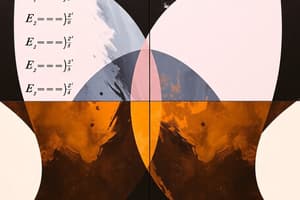Podcast
Questions and Answers
An optical illusion is a classic example of how our ______ system can mislead us.
An optical illusion is a classic example of how our ______ system can mislead us.
perceptual
When we differentiate between various nuances, we enhance our ability to perceive the subtle details and complexities within our ______.
When we differentiate between various nuances, we enhance our ability to perceive the subtle details and complexities within our ______.
environment
In the field of psychology, perception plays a significant role in shaping how people differentiate between various ______.
In the field of psychology, perception plays a significant role in shaping how people differentiate between various ______.
stimuli
People with synesthesia often perceive colors, shapes, or textures in response to various ______ inputs.
People with synesthesia often perceive colors, shapes, or textures in response to various ______ inputs.
Our ability to differentiate between nuances enhances our ______ of the world around us.
Our ability to differentiate between nuances enhances our ______ of the world around us.
Flashcards are hidden until you start studying
Study Notes
Navigating Nuances: A Deeper Dive into Differentiation and Perception
As you delve into the captivating world of nuances, we'll explore two interconnected avenues: differentiation and perception. These concepts, when considered together, enhance our understanding of how humans interpret, process, and interact with the world around us.
Differentiation
In essence, differentiation refers to the ability to discern subtle distinctions between seemingly similar things. This skill is essential in various fields, including art, music, language, and science.
To illustrate, consider the case of a painter who attempts to render the nuances of a particular shade of blue. They must have the skill to differentiate between various shades to achieve the desired effect. Similarly, a musician must be able to distinguish between the slight variations in pitch and tone to create harmonious melodies.
Differentiation is not just limited to the arts. In science, it plays a role in the development of more accurate classification systems, such as the categorization of species and the identification of diseases.
Perception
Perception, on the other hand, embodies the way we interpret and make sense of the world around us. It's the brain's process of organizing and interpreting sensory information to form perceptions of the environment.
Perception is influenced by a variety of factors, including experience, expectations, and cultural background. For instance, the scent of freshly baked bread might take you back to your childhood, while for someone else, it might evoke a completely different memory.
Moreover, perception does not always correspond with reality. An optical illusion is a classic example of how our perceptual system can mislead us. Even though our eyes may perceive a flat surface, our brain interprets it as a three-dimensional object.
The Intersection of Differentiation and Perception
As we've seen, differentiation and perception are closely related and intertwined. When we differentiate between various nuances, we enhance our ability to perceive the subtle details and complexities within our environment.
For example, consider the art of wine tasting. A skilled connoisseur must differentiate between the intricate flavors and aromas of various wines to accurately perceive their nuances. Similarly, a seasoned chef must differentiate between the various flavors and textures of ingredients to create a well-balanced dish.
Likewise, in the field of psychology, perception plays a significant role in shaping how people differentiate between various stimuli. For instance, people with synesthesia often perceive colors, shapes, or textures in response to various sensory inputs, such as hearing or touch.
Conclusion
In conclusion, differentiation and perception are two interconnected facets of the human experience. Our ability to differentiate between nuances enhances our perception of the world around us, allowing us to experience and interpret the world in more complex and nuanced ways.
By exploring these concepts, we can better understand the richness and complexity of human experience, and perhaps even improve our own abilities to perceive and differentiate between nuances in our daily lives.
Studying That Suits You
Use AI to generate personalized quizzes and flashcards to suit your learning preferences.




